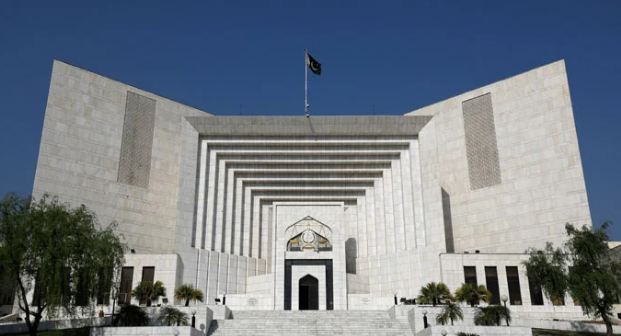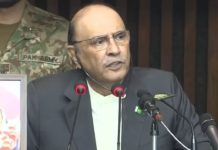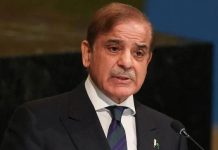ISLAMABAD: A three-member bench headed by Chief Justice of Pakistan (CJP) Umar Ata Bandial will take up Pakistan Tehreek-e-Insaf (PTI) Chairman Imran Khan’s petition challenging the Islamabad High Court’s (IHC) decision on the Toshakhana case on Wednesday (August 23).
Apart from CJP Bandial, the bench will comprise Justice Sayyed Mazahar Ali Akbar Naqvi and Justice Jamal Khan Mandokhail.
They will hear the plea filed by the PTI chairman on August 5 challenging the IHC’s decision that declared the sessions court’s maintainability verdict in the Toshakhana case against the PTI chief “void”.
IHC Chief Justice Aamer Farooq gave the court’s ruling on eight petitions of the PTI chairman after arguments by both parties — which were completed.
The court, however, rejected the former prime minister’s request to transfer the case to another court and said that Additional Sessions Judge Humayun Dilawar would hear the case.
On October 21, 2022, the Election Commission of Pakistan (ECP) maintained that the former prime minister made “false statements and incorrect declarations” about the gifts and disqualified him under Article 63(1)(p) of the Constitution.
Subsequently, the election watchdog moved the sessions court to the federal capital. It sought criminal proceedings against the PTI chief for allegedly misleading the ECP regarding gifts received from foreign dignitaries while he was in office.
The PTI chief was indicted in the case on May 10, while his petition to declare the case inadmissible was rejected by the court.
On July 4, the IHC overturned the same ruling and directed the sessions court to hear the petitioner and decide the matter within seven days.
On July 8, ADSJ Humayun Dilawar declared the Toshakhana case against Khan as maintainable, which was again challenged in the IHC.
Meanwhile, the trial continued at the court and a day after the IHC verdict PTI Chairman Imran Khan was arrested from his Zaman Park residence in Lahore soon after being convicted in the Toshakhana case.
The sessions court in the federal capital convicted the former prime minister for corrupt practices related to the state gift depository — allegations which he denies.
The 70-year-old cricketer-turned-politician was accused of misusing his premiership to buy and sell gifts in state possession that were received during visits abroad and worth more than 140 million Pakistani rupees ($635,000).
Rejecting Khan’s petition seeking inadmissibility of the case, Additional and Sessions Judge Humayun Dilawar sentenced the former prime minister to three-year imprisonment.
“Charges of misdeclaration of assets have been proven against PTI chairman,” Judge Dilawar mentioned in his judgment.
He then handed Khan three years in jail along with a fine of Rs100,000, while issuing an arrest warrant for his immediate arrest.
What is Toshakhana?
Established in 1974, Toshakhana is a department under the administrative control of the Cabinet Division and stores precious gifts given to rulers, parliamentarians, bureaucrats and officials by heads of other governments and states and foreign dignitaries as a goodwill gesture.
It has valuables ranging from bulletproof cars, gold-plated souvenirs and expensive paintings to watches, ornaments, rugs and swords.
SC hearing on Jaranwala incident delayed
Meanwhile, CJP Bandial has also constituted a three-member bench — comprising himself, Justice Athar Minallah and Justice Shahid Waheed — to hear pleas filed on the Jaranwala incident.
The bench will take up the case on August 22 and notices have been issued to all the parties in the case.
Later, it was learnt the Supreme Court has deferred the hearing on the issue as the Human Rights Cell has not received the police report on the incident.
“I was told by the Supreme Court that the case is scheduled for hearing tomorrow [Tuesday] but if was informed later that the Human Rights Cell report on the incident has not yet been received which is why the hearing will not be held,” petitioner Samuel Pyare told Geo News.
On August 16, a crowd vandalised several churches and set scores of houses on fire in Jaranwala town of the industrial district of Faisalabad after clerics made announcements in mosques inciting the mob to attack the Christian community under allegations of blasphemy.
Paramilitary troops were called in to handle the violence and bring the situation under control, according to a government order.
The attack sparked outrage on social media and among political and religious figures in Pakistan, who condemned the incident, saying that there was no room for such extreme behaviour.

















